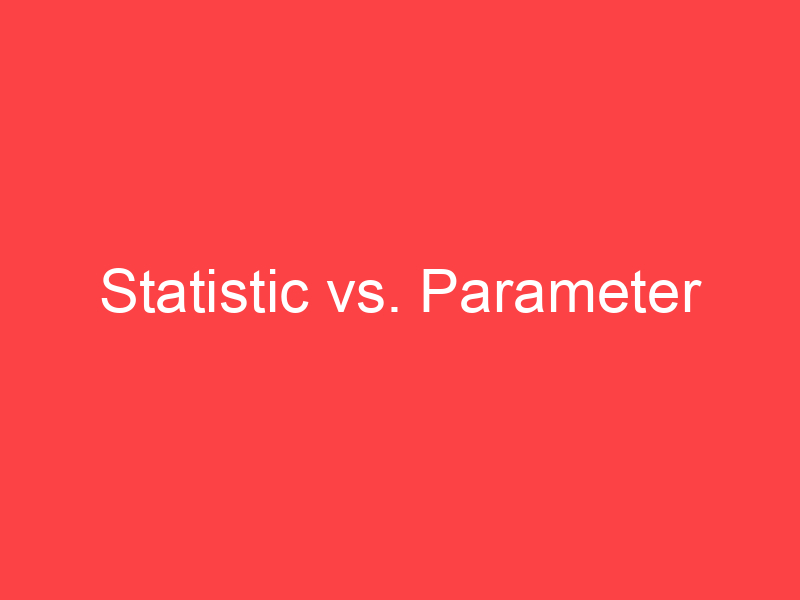Main Difference
The main difference between Statistic and Parameter is that the Statistic is a single measure of some attribute of a sample and Parameter is a measurable characteristic
-
Statistic
A statistic (singular) or sample statistic is a single measure of some attribute of a sample (e.g. its arithmetic mean value). It is calculated by applying a function (statistical algorithm) to the values of the items of the sample, which are known together as a set of data.
More formally, statistical theory defines a statistic as a function of a sample where the function itself is independent of the sample’s distribution; that is, the function can be stated before realization of the data. The term statistic is used both for the function and for the value of the function on a given sample.
A statistic is distinct from a statistical parameter, which is not computable in cases where the population is infinite, and therefore impossible to examine and measure all its items. However, a statistic, when used to estimate a population parameter, is called an estimator. For instance, the sample mean is a statistic that estimates the population mean, which is a parameter.
When a statistic (a function) is being used for a specific purpose, it may be referred to by a name indicating its purpose: in descriptive statistics, a descriptive statistic is used to describe the data; in estimation theory, an estimator is used to estimate a parameter of the distribution (population); in statistical hypothesis testing, a test statistic is used to test a hypothesis. However, a single statistic can be used for multiple purposes – for example the sample mean can be used to describe a data set, to estimate the population mean, or to test a hypothesis.
-
Parameter
A parameter (from the Ancient Greek παρά, para: “beside”, “subsidiary”; and μέτρον, metron: “measure”), generally, is any characteristic that can help in defining or classifying a particular system (meaning an event, project, object, situation, etc.). That is, a parameter is an element of a system that is useful, or critical, when identifying the system, or when evaluating its performance, status, condition, etc.
Parameter has more specific meanings within various disciplines, including mathematics, computing and computer programming, engineering, statistics, logic and linguistics. Within and across these fields, careful distinction must be maintained of the different usages of the term parameter and of other terms often associated with it, such as argument, property, axiom, variable, function, attribute, etc.
-
Statistic (adjective)
alternative form of statistical
-
Statistic (noun)
A single item in a statistical study.
-
Statistic (noun)
A quantity calculated from the data in a sample, which characterises an important aspect in the sample (such as mean or standard deviation).
-
Statistic (noun)
A person, or personal event, reduced to being an item of statistical information.
“By dying from an overdose, he became just another statistic.”
-
Parameter (noun)
A value kept constant during an experiment, equation, calculation or similar, but varied over other versions of the experiment, equation, calculation, etc.
-
Parameter (noun)
a variable that describes some system (material, object, event etc.) or some aspect thereof
-
Parameter (noun)
An input variable of a procedure definition, that gets an actual value (argument) at execution time (formal parameter).
“Roughly, a tuple of arguments could be thought of as a vector, whereas a tuple of parameters could be thought of as a covector (i.e., linear functional). When a function is called, a parameter tuple becomes “bound” to an argument tuple, allowing the function instance itself to be computed to yield a return value. This would be roughly analogous to applying a covector to a vector (by taking their dot product (or, rather, matrix-product of row vector and column vector)) to obtain a scalar.”
-
Parameter (noun)
An actual value given to such a formal parameter (argument or actual parameter).
-
Parameter (noun)
A characteristic or feature that distinguishes something from others.
-
Parameter (noun)
In the ellipse and hyperbola, a third proportional to any diameter and its conjugate, or in the parabola, to any abscissa and the corresponding ordinate.
“The parameter of the principal axis of a conic section is called the latus rectum.”
-
Parameter (noun)
The axes which determines the position of any plane.
-
Parameter (noun)
The fundamental axial ratio for a given species.
-
Statistic (noun)
a fact or piece of data obtained from a study of a large quantity of numerical data
“the statistics show that the crime rate has increased”
-
Statistic (noun)
an event or person regarded as no more than a piece of data (used to suggest an inappropriately impersonal approach)
“he was just another statistic”
-
Statistic (adjective)
another term for statistical
-
Parameter (noun)
a numerical or other measurable factor forming one of a set that defines a system or sets the conditions of its operation
“there are three parameters by which a speaker is able to modify the meaning of the utterance—pitch, volume, and tempo”
-
Parameter (noun)
a quantity whose value is selected for the particular circumstances and in relation to which other variable quantities may be expressed.
-
Parameter (noun)
a numerical characteristic of a population, as distinct from a statistic of a sample.
-
Parameter (noun)
a limit or boundary which defines the scope of a particular process or activity
“the parameters within which the media work”

